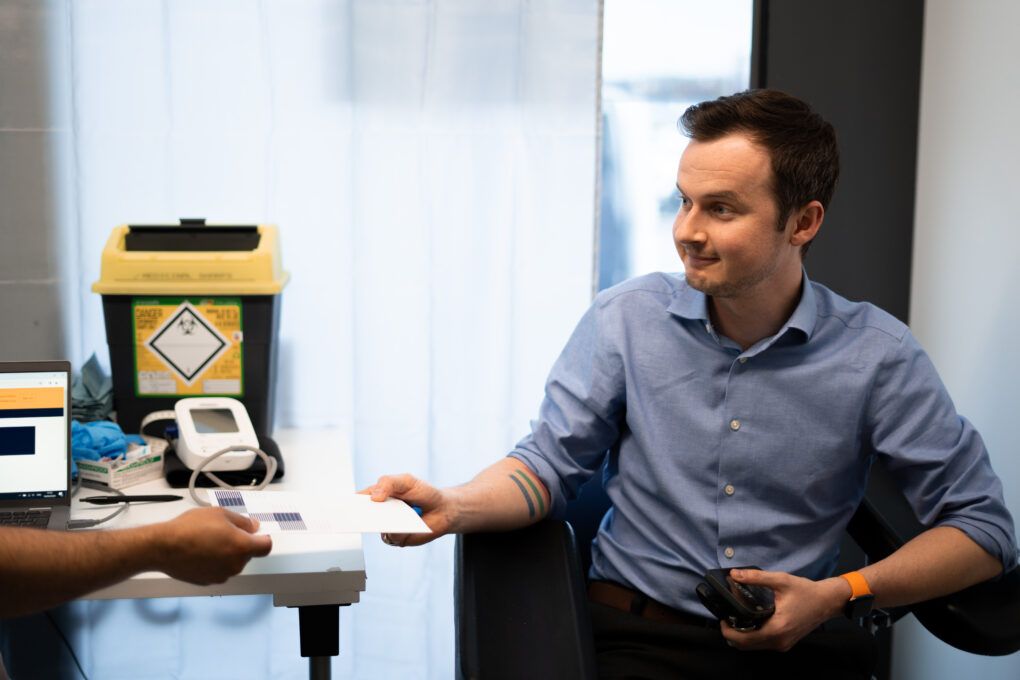‘My dad’s heart attack was a wake-up call. Now I’m determined to improve preventative medicine for everyone’

I’ll never forget taking the call from Dad. I was at a family gathering and he was at a petrol station, on his way back from work in London. In a way, the call changed both of our lives.
Dad is a type 1 diabetic. When I picked up the phone, he said he thought he was “having a hypo”, meaning he was in a state of hypoglycaemia. It’s when you get very low blood sugar and it can make you feel dizzy and weak. He also said he’d eaten some sugar but still didn’t feel right.
I was 23 at the time and I’d just finished my fifth year at university, studying to be a pharmacist. I asked, “have you got any chest pain?”. He said yes. Then I asked, “is it radiating down your left side?” He said yes again. He also felt clammy and sleepy.
Dad was describing classic signs of a heart attack. I told him to call an ambulance, “right now!”
A long recovery
My dad ended up in intensive care for a month. He’d had a significant heart attack. And because he’d waited so long to get help, it had done a lot of damage.
He spent the next year in and out of hospital.
The heart attack really knocked him. He’d had an active job as a carpenter before, so he’d always been quite fit. Today, 12 years on, he’s 58 and living with a heart function that’s only 25-30% of what it should be. He often feels breathless.
As a family, we’re so happy that he got treatment just in time. But we also know more could have been done to prevent the heart attack from happening in the first place.
Retraining as a prescribing pharmacist
Dad’s experience led me to realise that I wanted to take a more proactive role in the health of my patients. Four years ago, I did additional training to become a prescribing pharmacist, which means I can diagnose and treat patients, and prescribe common medicines. I lead a team that works out of four GP surgeries, treating patients for common conditions and helping GPs get medications right when cases are more complex. From 2026, all new qualified pharmacists will be prescribing pharmacists.
In my work, I’ve seen how a lot of diseases are silent – they have no symptoms. So many people are walking around with high blood pressure or high cholesterol and they have no idea.
I’ll give you an example. Recently a 55-year-old man came in for a regular review and when I tested his blood pressure it was incredibly high – but he’d experienced no symptoms at all. Now that we know his blood pressure is high, we can do something about it, like prescribe medicines or suggest changes to his lifestyle. It means we can prevent him experiencing complications in the future.
Our Future Health and the power of prevention

Prevention of disease is the reason I signed up with Our Future Health. The appointment was easy and I was in and out in 15 minutes. It’s a really good way of supporting a great cause – and learning about your health. You get your blood pressure and cholesterol measured, so it will pick up if your readings are out of range.
But more than that, the genetic research that will come from Our Future Health’s data could become part of an early warning system for patients. People could find out they’re at risk long before they’ve developed the condition.
If patients can be told that, for example, they have a high genetic risk factor for a disease, it will also help pharmacists and doctors make sure those patients get the right advice and early treatment.
I’ve seen how people can really transform the future of their health when they’re given a wake-up call. Recently, a 66-year-old female patient managed to reverse prediabetes simply by getting more active and making some good dietary changes.
Practicing what I preach
I try to practice what I preach on prevention. Because of my family history, I’m at a high risk of heart disease. So, three years ago, I volunteered to start taking a statin. It’s a medication that helps lower cholesterol levels, reducing my risk of suffering a heart attack like Dad.
I also try to do some of the right things in terms of lifestyle, by staying active and growing my own fruit and veg. I’m not perfect, though – I could still cut down a little on alcohol.
I suppose there is an upside to Dad’s heart attack. It gave me an early warning of my own possible health problems, albeit one I dearly wish hadn’t happened.
In the future, the work of Our Future Health will hopefully teach us about the genetics of heart disease. Then people can be told in their 20s or 30s that they are at high risk of heart disease – an early warning of a gentler kind.

Let’s prevent disease together
By volunteering for Our Future Health, you can help health researchers discover new ways to prevent, detect and treat common conditions such as diabetes, cancer, heart disease, stroke and Alzheimer’s.